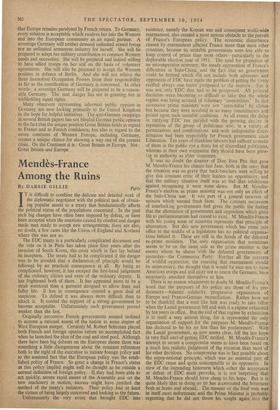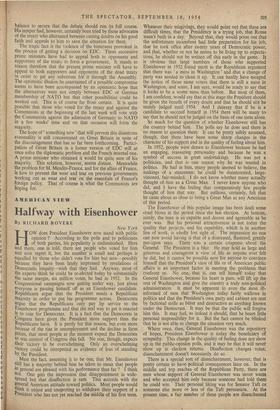Mendes-France Among the Ruins
IT is difficult to combine the delicate and detailed work of the diplomatic negotiator with the political task of obtain- ing popular assent to a treaty that fundamentally affects the political status of the populations concerned. In the past such big changes have often been imposed by defeat, or have been accepted when the emotions caused by combat and danger made men ready to accept new arrangements; there are also, no doubt, a few cases like the Union of England and Scotland where this was not so.
The EDC treaty is a particularly complicated document and the vote on it in Paris has taken place four years after the invasion of South Korea, the crisis which in fact lay behind its inception. The treaty had to be complicated if the danger was to be avoided that a declaration, of principle would be followqd by no practical consequence at all. By being so complicated, however, it has escaped the first-hand judgement of the ordinary citizen and even of the ordinary deputy. It has frightened both of them. It has appeared more to be a strait waistcoat than a garment designed to allow freer and fuller life. It has in consequence created a great deal of suspicion. To defend it was always more difficult than to attack it. It needed the support of a strong government to become acceptable. Unfortunately each government proved weaker than the last.
Originally successive French governments seemed inclined to assume a rational assent of the nation to some degree of , West European merger. Certainly M. Robert Schuman placed both French and foreign opinion before an accomplished fact when he launched the plan of the coal and steel pool. Although there have been big debates on the European theme there was something a little disingenuous about the constant references both to the right of the executive to initiate foreign policy and to the assumed fact that the European policy was the estab- lished policy of France. So great a change in France's status as this policy implied might well be thought to be outside a normal definition of foreign policy. If, they had been able to act quickly, secure rapid assent of the Assembly and set the new machinery in motion, success might have justified the method of the treaty's initiators. Their policy had at least the virtues of being largely conceived and looking to the future. existence, namely the Korean war and consequent world-wide rearmament, also created a most serious obstacle to the pursuit of France's European policy. The economic disturbance caused by rearmament affected France more than most other countries, because its unstable governments were less able to keep control of prices than most others—particularly in the deplorable election year of 1951. The need for protection of an uncompetitive economy, the steady aggravation of France's difficulties in Indo-China. and the fact 'that no government could be formed which dki not include both advocates and opponents of EDC have made the problem of getting the treaty ratified always one better postponed to the morrow. But it was not only EDC that had to be postponed. All political decisions were becoming so difficult to take that the whole regime was being accused of voluntary ' immobilism.' In fact successive prime ministers were not ' immobilist ' by choice but because they were involved in so many commitments and poised upon such unstable coalitions. At all events the delay in ratifying EDC ran parallel with the growing dec.ine in reputation of the group of politicians who, in a variety of permutations and combinations, and with indisputable deter- mination had been responsible for French government since Liberation. Ten years of thankless labours had sufficed to make of them in the public eye a dusty lot of discredited politicians, whereas in their own estimation they shou:d have been grow- ing in authority as elder statesmen.
It was no doubt the disaster of Dien Bien Phu that gave M. Mendes-France his chance last June, both in the sense that the situation was so grave that back-benchers were willing to give this constant critic of their leaders an opportunity, and that the military situation itself was so bad that inhibitions against recognising it were worn down. But M. Mendes- France's election as prime minister was not only an effect of the Indo-China war. It was part of a general turnover of opinion which wanted fresh faces. The constant succession of interlocking governments had given the public the feeling that the alternation of government and opposition which gives life to parliamentarism had ceased to exist. M. Mendes-France with his young team of ministers represents that principle of alternation. But this new government which has come into office in the middle of a legislature has no political organisa- tions behind it. These are still in the hands of the defeated ex-prime ministers. The only organisation that sometimes seems to be on the same side as the prime minister is the enemy whom he shares with the defeated governments of yesterday—the Communist Party. Further all the currents of wishful opposition, the yearning that rearmament should be ,unnecessary, the thought that it would be nice not to have American troops and still nicer not to rearm the Germans, have necessarily attached themselves to him.
There is no reason whatsoever to doubt M. Mendes-France's word that the purposes of his policy are those of his pre- decessors—Atlantic solidarity, progressive organisation of Europe and Franco-German reconciliation. Rather have we to be thankful that a man like him was ready to take office when the Lanicl government fell and with it a regime exhausted by ten years in office. But the end of that regime by exhaustion is in itself a very serious thing, for it represented the only organisation of support for the purposes M. Mendes-France has declared to be his no less than his predecessors'. With the Laniel government, as now seems clear, fell the last hope (a very frail one) of getting EDC ratified. M. Mendes-France's attempt to secure a compromise seems to have been based on a much less realistic judgement of the situation than most of his other decisions. No compromise was in fact possible about the supra-national principle, which was an essential part of the EDC cause and quite unacceptable to its opponents. In view of the impending bitterness which either the acceptance or defeat of EDC must provoke, it is not Surprising that M. Mendes-France should have clung to his hope. But it is quite likely that in doing so he has accentuated the bitterness both at home and abroad. The manner of the final vote was in itself most unfortunate and the Prime Minister is probably , balance to secure that the debate should run its full course. His temper had, however, certainly been tried by those advocates of the treaty who alternated between casting doubts on his good faith and appeals to him to save the situation for them.
The tragic fact is the violence of the bitterness provoked in the process of getting a decision on EDC. Three successive prime ministers have had to appeal both to opponents and supporters of the treaty to form a government. It stands to reason therefore that the present prime minister will have to appeal to both supporters and opponents of the dead treaty in order to get any substitute for it through the Assembly. The optimistic illusion he entertained of a possible compromise seems to have been accompanied by an optimistic hope that the alternatives were not simply between EDC or German membership of NATO but that other possibilities could be worked out. This is of course far from certain. It is quite possible that those who voted for the treaty and against the Communists at the beginning of the last week will vote with the Communists against the admission of Germany to NATO in a few weeks' time and on that occasion will form the majority.
The hope of something new 'that will prevent this disastrous eventuality is still concentrated on Great Britain in spite of the discouragement that has so far been forthcoming. Partici- pation of Great Britain in a looser version of EDC will at once solve the diplomatic problem and the French internal one. A prime minister who obtained it would be quite sure of his majority. This solution, however, seems distant. Meanwhile the problem for M. Mendes-France, and for the allies of France, is how to prevent the wear and tear on previous governments Working out as wear and tear on the essentials of Frances foreign policy. That of course is what the Communists are hoping for.



































 Previous page
Previous page